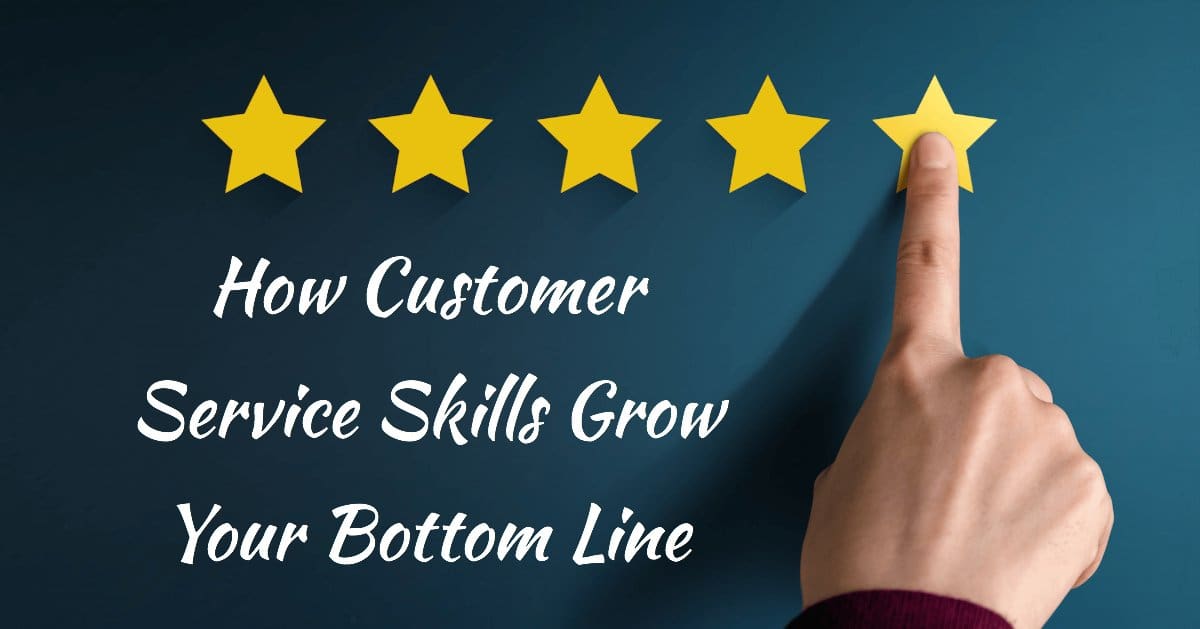
Are you struggling to compete and draw in new customers when you can no longer afford to lower prices?
Are you watching your customers leave you for a competitor with the same products as you?
It may be a result of your customer service skills.
If you desire to grow your business and raise your bottom line, read this article to find out how to use customer service skills to better your business.
Table of Contents
ToggleHow Customer Service Skills Can Raise Your Bottom Line
This is Sam.


This is Sam.
Sam runs a successful auto-repair shop. He loves his job, and he enjoys helping customers.
He has seen substantial growth in his business as he continues to raise his bottom line.
This is Jack.


Jack owns an auto-repair shop in the same town as Sam. He offers all of the same services as Sam and has similar prices.
However, Jack can’t seem to draw in business.
His bottom line has stayed the same, and he’s struggling to compete with Sam.
Why is Sam doing so much better when it seems like their businesses are the same?
Jack’s Customer Service Skills
Jack tries his best to compete with Sam, but he can no longer afford to lower his prices.
Why is Sam doing so much better?
Let’s take a look at Jack operating his business on a daily basis:
Greeting Customers
Jack and his employees man the front desk of the office space when they are not in the garage working on cars.
When customers walk into the shop, they briefly look up but do not say hello and make no comment. Customers immediately feel uncomfortable and nervous about approaching an employee for help.
When they do approach the front desk, Jack and his employees offer a passive, canned response to the customer’s greeting.
The customer had hoped to find a mechanic he could trust, but he begins to doubt that Jack will hit that mark, and he is hesitant to ask for help.
Responding to Questions
Customers will have a lot of questions when having work done on their cars.
They want to make sure that their vehicle is in good hands. They need to know that their mechanic is someone that they can trust.
When a customer approaches Jack with a question, he acts like they are interrupting something important, and he doesn’t have time to talk to them. He mumbles his response and treats the customer’s question like it is stupid.He creates angry customers through his lack of ability to listen to customers. Jack must develop a positive attitude while listening to customers issues.


When he answers questions, he often doesn’t respond in a timely manner. His customers don’t feel like they’re being heard. Many customers see Jack’s poor response to their questions as shady, and they decide they cannot trust him as a mechanic. His body language shows that he isn’t listening. Jack has poor active listening skills and virtually none of this soft skill.
Jack’s customer service skills are clearly lacking in this area.
Updating Customers
If a customer gives you their car to fix and take care of, they’ll want to be kept informed on the process.
When Jack is working on a vehicle, he often doesn’t respond quickly to customer inquiries about the status of the vehicle.
He doesn’t outline his plans so customers know how he will fix their cars. Customers are often left in the dark. When they call and ask for an update, employees are busy and have poor phone rapport. They want a customer service agent that goes the extra mile to satisfy them.
Customer frustration begins to grow as a result of Jack’s bad customer service and communications skills, and they begin to look elsewhere for a mechanic.
Delivering the Result
When the car is finally finished and ready to be picked up, customers want to know the steps that were taken to fix it.
Jack simply presents the finished vehicle without explaining his process.
The final product may be delivered with the quality of a good mechanic, but customers remain unsatisfied. Jack’s lack of strong customer service skills leaves them feeling like they weren’t properly taken care of and results in lower customer satisfaction.
The next time they need work done on their car, they avoid Jack’s repair-shop and go to someone else.


Sam’s Customer Service Skills
Sam knows that he can raise his bottom line by providing a great customer experience.
He’s proud of his skill sets as a mechanic, and he knows that he delivers good work.
Sam knows that the skills required in his job go beyond simply being a mechanic.
Customers are comfortable going to him with their car troubles, and he enjoys the opportunity to assist them.
Greeting Customers
When customers come into his shop, he greets them warmly. He asks how their day is going and assures them that he’s happy to help them with their vehicle.
Many customers have been coming to Sam for years. He greets them by name and keeps up a friendly rapport.
When new customers approach him, he welcomes them and makes them feel comfortable. Customers begin to trust him and are ready to seek his services.
Responding to Questions
Sam loves to help his customers. He wants to assure them that he will do his best to provide a great service, but he knows that they will still have questions.
Sam has excellent customer engagement. He possesses the organizational skills required to show his customers that he understands their problems and wants to help them with his technical skills and training.
When customers approach Sam and his staff with questions, he takes the time to listen carefully to their concerns. He treats each individual as a valued customer and responds to their questions with attentiveness.
Customers feel assured by Sam’s customer service skills, and they trust him as their mechanic.
Updating Customers
When it comes to having the key skill of customer service, Sam knows that customers will appreciate being updated on the status of their vehicles.
They have entrusted their cars into his hands, and he wants to assure them that everything is running smoothly.
Before beginning his process, Sam outlines his plan for fixing the car’s problem. When he completes a big step in his plan, he notifies the customer so they know exactly what’s going on.
Customers don’t worry about the status of their vehicles. They trust Sam, and he makes them feel like they are a vital part of the process.
Delivering the Result
When Sam promises that a car will be ready in three days, he delivers on that promise!
When a customer receives their repaired vehicle, they are confident that the work is sound. Sam tells them all the steps he took to fix the car and lets them know some of the steps they can take to maintain their vehicle’s quality.


Customers appreciate Sam’s attentiveness. They’ll definitely return to him when they need auto repairs in the future, and they don’t hesitate to recommend him to others.
Sam has built strong customer relationships through how he is interacting with customers. He has strong time management skills and is able to listen to his customers, while still being productive throughout his day.
The Bottom Line
Even though their services and prices are the same, Sam still gets more business than Jack. He continues to raise his bottom line while Jack’s stays put.
When it comes to customer service skills and teamwork skills, Sam far outranks Jack. Customers go to him because they trust him and have a good experience.
Implementing interpersonal skills through both nonverbal and verbal communication is critical in improving your customer relations. Your customers want to know that you have top skills in customer service.
Improved customer relations will inevitably lead to improved customer feedback, which will help to grow your business quicker and more effectively. When customers are satisfied with your customer service representatives and customer service professionals, it will very likely increase customer loyalty as well.
Business owners should realize that any job involving the selling of a particular product to a customer is, essentially, a customer service job. It may not be in the sense of a live chat with customer service roles in a call center, but it is in that you must satisfy your customer to keep that customer.
Being able to simply provide product knowledge bases will help customers learn more about your product, and feel comfort in that they have a resource to turn to. Many times, companies will also start posting on social media to give their customers a more friendly, available feel.
Having customer service skills also means remaining calm while receiving customer complaints. This is especially true when dealing with a clearly frustrated customer who might have had a poor encounter with your business.
When you deal with customers who have had a poor experience, you must use effective communication methods to make them feel heard and understood. Positive language develops positive experiences.
Sam does things like that. As a result, Sam gets more customers than Jack and his bottom line rises.
Don’t be like Jack. Good customer service skills can raise your bottom line! Learn more about customer service skills by reading 8 Best Customer Service Examples to Inspire Your Team!
When employers look for and post jobs for a customer service team and then host a job interview for applicants, the employers must discover if they have the essential customer service skill of dealing with difficult customers, as well as general customer relationship management skills. If they can deal with difficult customers, they can handle the easy ones with no problems.










